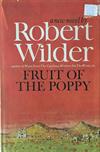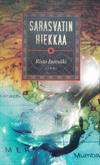
Woman on the Edge of Time (A Women's Press classic)
5 journalers for this copy...
registered to aid the Race to Three Million Book Challenge - 15th April 2006
read for Second to Thirwave Feminism & Women's writing course & Loooooved! Piercy's pre 1970's lifealtering femininst utopian vision.
Connie Ramos is 37, Mecxican-American ; a loving mother now labelled child abuser; an heroically sane woman, now declared insane Drugged, a helpless inmate of a mental hospital, she is offered only one way back to 'normality' - participation in a mind-control experiment using eloectonic implantations in the brain. But Connie is also a 'catcher', a natual telepath with the ability to enter a Utopian future of ecological and social harmony. As the doctors close in Connie realises she has a fight on er hands - a fight in which a future world and her own life are at stake...
pm me to join the...
List of Lucky BookRing Readers:
Lottiotta (HouseofGerald, Swansea, Wales)
AliceF (UK)
Shimmy-crazy (UK)
Eskielover (USA)
mellonhead (USA)
heartsong2 (USA)
menalima (Portrugal)
... & back to me where ever i am living @ the time...
Enjoy! :)
read for Second to Thirwave Feminism & Women's writing course & Loooooved! Piercy's pre 1970's lifealtering femininst utopian vision.
Connie Ramos is 37, Mecxican-American ; a loving mother now labelled child abuser; an heroically sane woman, now declared insane Drugged, a helpless inmate of a mental hospital, she is offered only one way back to 'normality' - participation in a mind-control experiment using eloectonic implantations in the brain. But Connie is also a 'catcher', a natual telepath with the ability to enter a Utopian future of ecological and social harmony. As the doctors close in Connie realises she has a fight on er hands - a fight in which a future world and her own life are at stake...
pm me to join the...
List of Lucky BookRing Readers:
Lottiotta (HouseofGerald, Swansea, Wales)
AliceF (UK)
Shimmy-crazy (UK)
Eskielover (USA)
mellonhead (USA)
heartsong2 (USA)
menalima (Portrugal)
... & back to me where ever i am living @ the time...
Enjoy! :)
Catch! Thanks very much, sounds just my kinda thing. I'm also happy to start the bookring with it, and we can both have links to this journal on our bookshelves. :) Best be someone in the UK as the first participant, mind! :)
At the rate I'm going, it's gonna be decades before I get to reading this... :S
At the rate I'm going, it's gonna be decades before I get to reading this... :S
Women Writing Political Writing in Marge Piercy’s ‘Woman on the Edge of Time’ and Helen Fielding’s ‘Bridget Jones’s Diary’.
Since ‘language is power, life and the instrument of culture, the instrument of domination and liberation,’ then literature is the politically conscious Feminist pacifist’s activist hammer with which to smash domination and envision liberation. Consciously Feminist political literature provides women with looking-glass narratives in which they may recognise their individual/collective condition/s and an individual/collective voice holding the power to subversively restructure the representation which structures ‘our consciousness of ourselves’ and ‘our external reality’ , with which to resist/critique patriarchal power structures and positively construct alternatives. Politics is ‘not something ‘out there’’ rather it is in ‘the essence of [woman’s] condition’ and since ‘[woman’s] freedom will reach [only] as far as her power to achieve her freedom reaches’ , women must seize their political pens as to write and fight back against oppression. This reading will critically consider the shape-shifting manifestation of Feminist politics in Second to Third Wave Feminist literature, through Marge Piercy’s Second Wave Feminist Utopian/Dystopian Woman on the Edge of Time and Helen Fielding’s Third Wave Feminist Chick Lit Bridget Jones’s Diary.
Marge Piercy’s Woman on the Edge of Time consciously engages with contemporary anti-psychiatric, anti-capitalism/-materialistic-greed pro-socialism/-ecological-wellbeing, Second Wave Feminist natural versus technological reproduction and anti-patriarchal political debates through her Gerhartian Feminist Utopia narrative, which ‘contrast[s]’ Connie’s (1950’s esque) 1970’s Caucasian/bourgeois/patriarchal hierarchical American ‘present’ with an ‘envisioned idealised’ race/class/gender egalitarian Mattapoisett 2137 future, as to ‘offer a comprehensive critique of present values/conditions’, which regards ‘men and male institutions as a major cause of present social ills’ and provides a visionary recipe for a brave new feminist world where ‘women’, ‘as the sole arbiters of their reproductive function’, become ‘equals of men’ . Piercy’s anti-patriarchal Utopia manifests Firestone’s pro technological reproduction argument - that ‘women would achieve liberation only when they were altogether free of their reproductive biology’ - by radically breaking the oppressive sexual-contract through technological reproduction (102) and sex/gender independent/unbiased (134) ‘comother[ing]’ (74). Furthermore, this pro technological reproduction Utopia eliminates racism and encourages diversity through the ‘mix[ing]’ of ‘genes’ and breaking of the ‘genes’/‘culture’ ‘bond’ (103-4). Moreover this complex, fully-realised, post woman-centred, global ecological, feminist vision, de-centralises traditionally oppressively hierarchical governmental power, replacing it with communist power/wealth sharing (thus eliminating capitalist economic/class prejudices) and deconstructs ‘nation-states’, replacing them with anti-capitalist/materialist/Age of Greed and Waste (240) global, community and ecological well-being concerned tribal coms, where each gender-neutral (post ‘liberal citizenship’) ‘global-ecological citizen’ per may freely choose/change per’s family mems, com, profession and post-modern identity . Though Piercy’s deeply politically engaged visionary Utopia recipe narrative allows for much, much further critical interrogation, this reading now breaks away from ‘Professors White and Black’ to consider the seemingly overlooked and yet absolutely crucial political significance and effect of Woman on the Edge of Time’s counter-psychiatric critique.
Woman on the Edge of Time’s anti-psychiatry madness narrative encourages the reader to read the screaming white space’s between the heavy print of psychiatry’s/psychiatric patients(/victims) ‘Official History’ , where the ‘other’(/true) side of the oppression evoked female malady suffering voiceless mad(/angry) woman monster’s silenced (her)story lies. Marge Piercy consciously exposes/dismantles the very misogynistic (re-)enclosing psychiatric(/patriarchal society) straightjacket structures which would fix(/(re-)enclose) those – who would rebelliously reject the dehumanising othering hierarchical patriarchal status quo, potentially evoke hierarchy/patriarchy smashing social change and manifest Piercy’s Utopian vision - mad(/rebelliously angry) monsters(/ideology transgressors), sick(/dangerous to the status quo) social misfits(/‘strong personalities’ (22)), gender-queers(/binary-dev(f)iants), witches(/feminists) and ‘socially maladjusted individuals’(/non-subordinate poor/black/women), into safely pacifying discursive and physical incarceration.
Connie is Psychiatric Modernisms emblematic paranoid schizophrenic victim/rebel rational madwoman ‘caught’ in the ‘experts’ ‘nets’ (60) in a hierarchical capitalist, Caucasian and patriarchal America in which ‘to be born poor’, ‘brown’ or a woman is ‘cirmi[nal]’ (62) and daring to transcend born subordination doubly so. Diagnosed(/labelled) as ‘Paranoid Schizophreni[c]’ (379) due to her ‘bizarre’(/unfeminine) violent(/self-defence) ‘behaviour’ (379 & 16), Connie is unfairly institutionalised as a ‘punishment for transgressing the codes of feminine behaviour’ . Piercy thus reveals how hierarchical patriarchal society through misogynistic modernist psychiatry, demonise and straightjacket oppression conscious and actively rebellious women. Connie’s institutional ‘loony bin’ (65) ‘wastebasket’ for ‘human garbage’ where ‘little is recycled’ (32) is critically exposed as a quasi patriarchal holding prison concentration camp for rebellious ‘strong personalities’ (22), which through Thorazine, Electroshock, Lobotomy and Dialytrode therapy, slowly kills their strong selves into properly feminine ‘helpless’ (111) ‘hopeless women’ (222). This misogynistic madhouse acts as a gender-transgressive correctional centre where the woman ‘rebel’ is ‘scared’ and ‘burned’ through electro ‘shock shop’ therapy (81) (a ‘rite of passage’ esque procedure which ‘kills off the ‘bad’[/transgressing] crazy self, and resurrects the ‘good’[/obedient] self’ ) into passive feminine obedience and given gender-correctional ‘beauty’ (108), ‘housework’ and ‘dance’ (83) therapy to (re-)encloses transgressive rebellious women(/feminists) into domestic-doll like womanliness. The drug abusing ‘zoo’ (87) of sub-human medical experimental ‘guinea pig[s]’ (203) further fixes rebellious women into stagnant passive femininity through psychoactive drugs which ‘keep her stupid’ (283) and ‘kill’ her unfeminine rebellious self ‘by inches’ (59) and dialytrodes which controllably ‘trigger’ desired feminine ‘emotion[s]’ (204), ‘turn…off’ Her undesired unfeminine ‘anger’ (302) and thus mechanically convert Her into a ‘machine’ of patriarchal ‘obedience’ (200). ‘Nothing [is] healed’ in this ‘bad joke’ (194) mental hospital, which renders explicit how modern psychiatry’s previously human subjects are monstered and forced into insanity’s deathly flight/fight cal de sac; flight Skip is ‘taught’ only the ‘value of a quick clean death’ (285) and ‘now…crazy’ (20 my emphasis) fight Connie is made mad/(/irrationally angry) and pushed into warlike murder of the ‘cold’, ‘calculating’ and ‘ambitious’, supposedly ‘rational’ and ‘superior’ (282), power hungry, nature raping Dr. Frankenstein Creators , who’s medical mutilations actively monstered ‘their experimental monster’ (279 my emphasis) madwoman Creature .
Marge Piercy’s critique of modern psychiatry’s misogynistic objectives/practices and dangerously dehumanising effects is optimistically contrasted by anti-psychiatric Mattapoisett, which rejects modern psychiatry’s ‘childish’ (196), ‘amaz[ingly]’ ‘arrogan[t]’ (233), ‘chemical controlling’ (197) practices as irresponsibly ‘consequence’/intention blind sign of a ‘technological’/‘power’ ‘imbalance’ (197) and favours anti-psychiatric inknowing. Mattapoisett’s madhouses are anti-psychiatric ‘re-servicing factory[s]’ where per is safely ‘guided’ into ‘inner space and time’ to ‘get in touch with the buried self’ (66) and where humane ‘co-op curing’ (275) replaces psychiatric modernisms absurdly ‘gross experiments’ (97). Luciente, in quasi Laingian ‘“schizophrenese”’ , radically de-stigmatises mad-persons/madness; presenting the mad ‘traveller’ as a ‘coherent’ (65) ‘catcher’ ‘whose mind and nervous system are open and receptive’ (42) and the ‘voyage of discovery’ ‘far inwards’ (65) as a comprehensible, ‘casual’ (124), regular, repeated (65) and enriching ‘disintegrat[ing]’(/breakdown) and ‘reintegrat[ing]’(/breakthrough) (66) experience in which per ‘has visions…. Earth quakes. Goes down. Emerges and gets to work again with harnessed passion’ (65).
Woman on the Edge of Time’s demythologising of the female malady crucially supports Piercy’s feminist Utopia as it dismantles patriarchal society’s discursive/physical feminist rebellion(/madness) incarcerating mind-manacles/safe-houses, through the consciousness raising political critique of misogynist modernist psychiatry, the de-demonising of Connie’s “madness” as provoked feminist rebellion, the rendering intelligible (and yet crucially not over-valorising) of the monstrous state of madness and the radical envisioning of alternative post-psychiatric discourses/practices, in order to deconstruct the ideological/physical incarcerating mind/social structures, which would (re-)enclose feminists who would rebel against, radically revolutionise patriarchy and potentially catalyse a Feminist Utopia . Thus the madness herstory becomes central to Piercy’s feminist political vision as it causes slight-handed direct reader consciousness raising, which crucially frees rebellious feminists from the dangers of incarceration and into the capacity to freely act to manifest Piercy’s Utopia, thus in turn causing direct political change. One may therefore regard the Utopia narrative as Piercy’s visionary political theory and the madness narrative as Piercy’s direct political action to manifest the theoretical vision. Thus Piercy in Woman on the Edge of Time is not merely theoretically writing of politics but actively writing politics!
Helen Fielding’s personal-is-political, 1990’s zeitgeist capturing, self-conscious, consciousness raising, Third Wave tells-it-like-it-is Chick Lit/‘trash’, Bridget Jones’s Diary, ironically subversively politically engages with contemporary post Second Wave sex-war revolution ‘Having it all’ Feminist debates and the capitalist consumerist ‘American myth’ ‘of self-perfection’ to explore the truth of idealised post-revolution modern woman’s confusing and ‘complicated times’ of contesting, qausi schizophrenic, narratives of doubly bound female im/perfection, through her thirty-something singleton hapless (anti-)heroine.
Child of the sexual revolution Bridget Jones, as one of Fay Wheldon’s ‘‘lost generation’ of alpha women’ who ‘were told they could have it all’ and ‘begin to find they can’t’ , marks the post-revolutionary emotional hardships of ‘Post’-Feminist women. Schizophrenically oscillating between Singleton power Feminism and contemporary as-if-Feminism-never-happened don’t-mention-the-embarrassing-‘f’-word culture, ‘Hitler youth ice maiden’/‘irresistible sex kitten’ Bridget reveals the conflicts between Feminist discourses and the reality of contemporary woman’s lives in this ‘false dawn of feminism’ world. Bridget fluctuates confusedly between power/victim Feminism in her use of Feminist narratives to empower herself (‘one must not live one’s life through men but must be complete as woman of substance’ (31)) and falling into the lonely ‘what’s wrong with me?’ (31) pit of romance despair – thus revealing the confused Post-Feminist’s difficulty to console Second Wave Feminisms stringent independence with heterosexual existence. Furthermore, Bridget’s private consolatory consumption of Feminism (‘The Enemy more like!’ I[Bridget] shouted happily, tucking into another Silk Cut’ (126)), contrasted by her public rejection (21) and private shame (‘there is nothing so unattractive to a man as strident feminism’ (20)), exposes the Post-Feminist’s confused ab/use of a political discourse rendered simultaneously consumerist product, shamefully ‘uncool’ and potentially damaging to her heterosexual womanly existence. Singelton Bridget is moreover a gender-specific ‘what’s wrong with me?’ (31) suffering victim of cultures as-if-feminism-never-happened damaging and potentially regressive prevolutionising archaic pre-Feminism pressures of female exchange-value marriage (‘Darling, do shag Mark Darcy over the turkey curry, won’t you? He’s very rich.’ (12)) and motherhood (‘You career girls! Can’t put it off forever you know tick-tock-tick-tock.’ (172)), which reveals post-revolution Singelton women as damagingly bound to their mythic ‘female sell-by date’ (213) and ostracised as ‘social outcasts’ (290) in this not-quite-post-feminist-yet! family orientated culture of Smug Marrieds. Furthermore, Bridget is caught in the professional woman’s precarious balancing act; Bridget’s flirtatious ‘…I am very busy and important’ (29) is greeted by Daniel’s patronisingly sexist ‘pressure must be hellish…. Ps. I like your tits in that top’ (29), revealing that ‘liberated’ ‘Post’-Feminists may assume professional positions only to collusively perform their professionalism in a feminine ‘masquerade’ esque manner and must passively allow for regular female subordination affirming patronising sexism. Finally, today’s ‘Post’-Feminist ‘traumatized’ ‘child of Cosmopolitan culture’ (59) falls victim to ‘the most powerful entities on earth… the multi-national corporations that see woman as their territory’ and promote, through damaging idealised images of femininity, America’s myth of female self-perfectionism through marketed femininity. In an attempt to become ‘a woman of substance’ (2) Bridget resorts to the false/consumerist consciousness breeding Magazine’s and Self-help books which portray ‘being a woman’ as a ‘problem’ ‘requiring’ stringent self improvement ‘therapy’ through the ‘pursuit of attainable goals’ (18). Bridget becomes the ‘warped reflection of the glossy Cosmo woman’ , exposing ‘how adept women’s magazines are at trading on women’s anxieties’ through her ‘inner poise’ questing (89), prematurely aging paranoia make-up cure (148), ‘new improved self’ personality make overs (185) and obsessive mix-and-match dieting (74), which, when the ‘joyous day’ (105) of ‘Body Dismorphia Disorder’ thinness arrives, highlights Fielding’s loved-just-as-she/you-is/are (106-7) message to her anxiously feminine self-perfection aspiring readers.
Bridget Jones’s Diary indulges in the deeply personal as to approach the deeply political. Fielding’s satire of Feminist discourses simultaneously exposes the failings of Second Wave Feminism and confused ‘Post’-Feminisms truly ironic blindness to and collusion with the very contemporary oppressive conservative and alienating consumerist society which reveals women to be far from the ‘Post’-Feminist golden dawn. Is it not rather curious then, considering the novel’s conscious zeitgeist capturing political engagement and extremely self-aware literariness, that Bridget Jones’s Diary’s is widely rejected as ‘trash’? The irony inherent in this derogatory label is that it is precisely this labelling which renders this feminine novel even more political than the label rejects it to be. As the ‘trash’ label highlights the literary genderism that is plaguing ‘trash’ feminine writers today in the exact manor that literary sexism plagued ‘women can’t and shouldn’t write’ women writers of Austen’s age. It is thus ironically its own ‘trash’ label which might transform Fielding’s political Chick Lit into literature.
Piercy’s Woman on the Edge of Time and Fielding’s Bridget Jones’s Diary engage with the political and summon literary political engagement in manners reflective of their Feminist times. Woman on the Edge of Time’s Dystopia/Utopia political engagement reflects the Second Wave’s pre-revolutionary political unrest and hopefulness, whilst her final chapter implicitly insists on female/feminist self-aware literary herstory re-/visions to counter the silencing, ghosting enclosure of ‘Official History’. In contrast Bridget Jones’s Diary’s playfully ironic political engagement ironically reflects Post-Feminisms playful irony, whilst her humorous, relaxed yet anxious tone and personal-meets-political narrative reflects Third Wave’s lessening urgency in political engagement and necessity to humanise the political in the face of contemporary anti-political/politically alientated ‘Post’-Feminists. Thus the work ‘must’ indeed ‘be political’ for both Piercy and Fielding, though Piercy’s directly urgent political ‘must’ ‘thrust’ has decreased in urgency and increased in ironic humour in Fielding’s political playful may(/but must) ‘thrust’. However this notion that the work ‘must’ be political is a fundamentally masculinist and artistically oppressive notion, equal to and stemming from patriarchal sexist disregard for the small-insignificant-(feminine)-novel-of-the-emotions and favouring of the big-important-(masculine)-novel-of-what-is-real. Though Second Wave Feminism has amazingly successfully eliminated literary sexism, there is a new oppressive monster in the literary house: hierarchical literary genderism, which we must not collude with but instead must consciously reject through a hierarchy dismantling and artistic shackle stripping freer may artistic aesthetic/consciousness.
Adams, Alice, ‘Out of the Womb: The Future of the Uterine Metaphor’, Feminist Studies 19/2 (Summer, 1993) pp.269-289.
Carter, Angela, ‘Notes from the Front Line’, Shaking a Leg: Journalism and Writings (London: Chatto & Windus, 1997) pp.36-43.
Carter, Angela, The Sadeian Woman (London: Virago Press, 1979).
Faludi, Susan, Backlash: The Undeclared War Against Women (London: Vintage, 1992).
Jones, Libby Falk and Sarah Webster Goodwin, Feminism, Utopia and Narrative (Knoxville: University of Tennessee Press, 1990).
Fielding, Helen, Bridget Jones’s Diary (London: Picador, 1997).
Gamble, Sarah, (ed.) The Routledge Companion to Feminism and Postfeminism (London: Routledge, 2001).
Lessing, Doris, The Golden Notebook (London: Flamingo, 2002).
Marsh, Kelly A., ‘Contextualising Bridget Jones’, College Literature 31.1 (Winter 2004), 53-72.
Morris, Pam, Literature and Feminism (Oxford; Cambridge, Mass.: Blackwell, 1993.)
Piercy, Marge, Woman on the Edge of Time (London: Women’s Press, 2001).
Rae, Shonaghe, ‘Did Women Win the War but Loose the Revolution’, You (The Mail on Sunday: 5th of March 2006).
Rich, Adrienne, ‘When We Dead Awaken: Writing as Re-Vision’, On Lies, Secrets and Silence: Selected Prose 1966-1978 (London: Virago, 1980).
Seabury, Marcia Budy, ‘The Monsters We Create: Woman on the Edge of Time and Frankenstein’, Critique: Studies in Contemporary Fiction, 42/2 (Winter 2001) pp.131-34.
Showalter, Elaine, The Female Malady: Women Madness and English Culture, 1830-1980, (London: Virago, 1987).
Silnerglied, Robin, ‘Woman, Utopia and Narrative: Toward a Postmodern Feminist Citizenship’, Hypatia: A Journal of Feminist Philosophy, 12/4 (Fall 1997) pp.156-77.
Wheleham, Imelda, Overloaded: Popular Culture and the Future of Feminism (London: Women’s Press, 2000).
Whelehan, Imelda, The Feminist Bestseller (Basingstoke: Palgrave, 2005).
(footnotes for this text wont appear and am too lazy to change reffrencing so for now quotes are from a vague somewhere in the books listed)
Summer 2006 Lvl 2 English Literature with Gender 'Second/Third Wave Feminism and Women's writing' Mark 80%/85% :)
Since ‘language is power, life and the instrument of culture, the instrument of domination and liberation,’ then literature is the politically conscious Feminist pacifist’s activist hammer with which to smash domination and envision liberation. Consciously Feminist political literature provides women with looking-glass narratives in which they may recognise their individual/collective condition/s and an individual/collective voice holding the power to subversively restructure the representation which structures ‘our consciousness of ourselves’ and ‘our external reality’ , with which to resist/critique patriarchal power structures and positively construct alternatives. Politics is ‘not something ‘out there’’ rather it is in ‘the essence of [woman’s] condition’ and since ‘[woman’s] freedom will reach [only] as far as her power to achieve her freedom reaches’ , women must seize their political pens as to write and fight back against oppression. This reading will critically consider the shape-shifting manifestation of Feminist politics in Second to Third Wave Feminist literature, through Marge Piercy’s Second Wave Feminist Utopian/Dystopian Woman on the Edge of Time and Helen Fielding’s Third Wave Feminist Chick Lit Bridget Jones’s Diary.
Marge Piercy’s Woman on the Edge of Time consciously engages with contemporary anti-psychiatric, anti-capitalism/-materialistic-greed pro-socialism/-ecological-wellbeing, Second Wave Feminist natural versus technological reproduction and anti-patriarchal political debates through her Gerhartian Feminist Utopia narrative, which ‘contrast[s]’ Connie’s (1950’s esque) 1970’s Caucasian/bourgeois/patriarchal hierarchical American ‘present’ with an ‘envisioned idealised’ race/class/gender egalitarian Mattapoisett 2137 future, as to ‘offer a comprehensive critique of present values/conditions’, which regards ‘men and male institutions as a major cause of present social ills’ and provides a visionary recipe for a brave new feminist world where ‘women’, ‘as the sole arbiters of their reproductive function’, become ‘equals of men’ . Piercy’s anti-patriarchal Utopia manifests Firestone’s pro technological reproduction argument - that ‘women would achieve liberation only when they were altogether free of their reproductive biology’ - by radically breaking the oppressive sexual-contract through technological reproduction (102) and sex/gender independent/unbiased (134) ‘comother[ing]’ (74). Furthermore, this pro technological reproduction Utopia eliminates racism and encourages diversity through the ‘mix[ing]’ of ‘genes’ and breaking of the ‘genes’/‘culture’ ‘bond’ (103-4). Moreover this complex, fully-realised, post woman-centred, global ecological, feminist vision, de-centralises traditionally oppressively hierarchical governmental power, replacing it with communist power/wealth sharing (thus eliminating capitalist economic/class prejudices) and deconstructs ‘nation-states’, replacing them with anti-capitalist/materialist/Age of Greed and Waste (240) global, community and ecological well-being concerned tribal coms, where each gender-neutral (post ‘liberal citizenship’) ‘global-ecological citizen’ per may freely choose/change per’s family mems, com, profession and post-modern identity . Though Piercy’s deeply politically engaged visionary Utopia recipe narrative allows for much, much further critical interrogation, this reading now breaks away from ‘Professors White and Black’ to consider the seemingly overlooked and yet absolutely crucial political significance and effect of Woman on the Edge of Time’s counter-psychiatric critique.
Woman on the Edge of Time’s anti-psychiatry madness narrative encourages the reader to read the screaming white space’s between the heavy print of psychiatry’s/psychiatric patients(/victims) ‘Official History’ , where the ‘other’(/true) side of the oppression evoked female malady suffering voiceless mad(/angry) woman monster’s silenced (her)story lies. Marge Piercy consciously exposes/dismantles the very misogynistic (re-)enclosing psychiatric(/patriarchal society) straightjacket structures which would fix(/(re-)enclose) those – who would rebelliously reject the dehumanising othering hierarchical patriarchal status quo, potentially evoke hierarchy/patriarchy smashing social change and manifest Piercy’s Utopian vision - mad(/rebelliously angry) monsters(/ideology transgressors), sick(/dangerous to the status quo) social misfits(/‘strong personalities’ (22)), gender-queers(/binary-dev(f)iants), witches(/feminists) and ‘socially maladjusted individuals’(/non-subordinate poor/black/women), into safely pacifying discursive and physical incarceration.
Connie is Psychiatric Modernisms emblematic paranoid schizophrenic victim/rebel rational madwoman ‘caught’ in the ‘experts’ ‘nets’ (60) in a hierarchical capitalist, Caucasian and patriarchal America in which ‘to be born poor’, ‘brown’ or a woman is ‘cirmi[nal]’ (62) and daring to transcend born subordination doubly so. Diagnosed(/labelled) as ‘Paranoid Schizophreni[c]’ (379) due to her ‘bizarre’(/unfeminine) violent(/self-defence) ‘behaviour’ (379 & 16), Connie is unfairly institutionalised as a ‘punishment for transgressing the codes of feminine behaviour’ . Piercy thus reveals how hierarchical patriarchal society through misogynistic modernist psychiatry, demonise and straightjacket oppression conscious and actively rebellious women. Connie’s institutional ‘loony bin’ (65) ‘wastebasket’ for ‘human garbage’ where ‘little is recycled’ (32) is critically exposed as a quasi patriarchal holding prison concentration camp for rebellious ‘strong personalities’ (22), which through Thorazine, Electroshock, Lobotomy and Dialytrode therapy, slowly kills their strong selves into properly feminine ‘helpless’ (111) ‘hopeless women’ (222). This misogynistic madhouse acts as a gender-transgressive correctional centre where the woman ‘rebel’ is ‘scared’ and ‘burned’ through electro ‘shock shop’ therapy (81) (a ‘rite of passage’ esque procedure which ‘kills off the ‘bad’[/transgressing] crazy self, and resurrects the ‘good’[/obedient] self’ ) into passive feminine obedience and given gender-correctional ‘beauty’ (108), ‘housework’ and ‘dance’ (83) therapy to (re-)encloses transgressive rebellious women(/feminists) into domestic-doll like womanliness. The drug abusing ‘zoo’ (87) of sub-human medical experimental ‘guinea pig[s]’ (203) further fixes rebellious women into stagnant passive femininity through psychoactive drugs which ‘keep her stupid’ (283) and ‘kill’ her unfeminine rebellious self ‘by inches’ (59) and dialytrodes which controllably ‘trigger’ desired feminine ‘emotion[s]’ (204), ‘turn…off’ Her undesired unfeminine ‘anger’ (302) and thus mechanically convert Her into a ‘machine’ of patriarchal ‘obedience’ (200). ‘Nothing [is] healed’ in this ‘bad joke’ (194) mental hospital, which renders explicit how modern psychiatry’s previously human subjects are monstered and forced into insanity’s deathly flight/fight cal de sac; flight Skip is ‘taught’ only the ‘value of a quick clean death’ (285) and ‘now…crazy’ (20 my emphasis) fight Connie is made mad/(/irrationally angry) and pushed into warlike murder of the ‘cold’, ‘calculating’ and ‘ambitious’, supposedly ‘rational’ and ‘superior’ (282), power hungry, nature raping Dr. Frankenstein Creators , who’s medical mutilations actively monstered ‘their experimental monster’ (279 my emphasis) madwoman Creature .
Marge Piercy’s critique of modern psychiatry’s misogynistic objectives/practices and dangerously dehumanising effects is optimistically contrasted by anti-psychiatric Mattapoisett, which rejects modern psychiatry’s ‘childish’ (196), ‘amaz[ingly]’ ‘arrogan[t]’ (233), ‘chemical controlling’ (197) practices as irresponsibly ‘consequence’/intention blind sign of a ‘technological’/‘power’ ‘imbalance’ (197) and favours anti-psychiatric inknowing. Mattapoisett’s madhouses are anti-psychiatric ‘re-servicing factory[s]’ where per is safely ‘guided’ into ‘inner space and time’ to ‘get in touch with the buried self’ (66) and where humane ‘co-op curing’ (275) replaces psychiatric modernisms absurdly ‘gross experiments’ (97). Luciente, in quasi Laingian ‘“schizophrenese”’ , radically de-stigmatises mad-persons/madness; presenting the mad ‘traveller’ as a ‘coherent’ (65) ‘catcher’ ‘whose mind and nervous system are open and receptive’ (42) and the ‘voyage of discovery’ ‘far inwards’ (65) as a comprehensible, ‘casual’ (124), regular, repeated (65) and enriching ‘disintegrat[ing]’(/breakdown) and ‘reintegrat[ing]’(/breakthrough) (66) experience in which per ‘has visions…. Earth quakes. Goes down. Emerges and gets to work again with harnessed passion’ (65).
Woman on the Edge of Time’s demythologising of the female malady crucially supports Piercy’s feminist Utopia as it dismantles patriarchal society’s discursive/physical feminist rebellion(/madness) incarcerating mind-manacles/safe-houses, through the consciousness raising political critique of misogynist modernist psychiatry, the de-demonising of Connie’s “madness” as provoked feminist rebellion, the rendering intelligible (and yet crucially not over-valorising) of the monstrous state of madness and the radical envisioning of alternative post-psychiatric discourses/practices, in order to deconstruct the ideological/physical incarcerating mind/social structures, which would (re-)enclose feminists who would rebel against, radically revolutionise patriarchy and potentially catalyse a Feminist Utopia . Thus the madness herstory becomes central to Piercy’s feminist political vision as it causes slight-handed direct reader consciousness raising, which crucially frees rebellious feminists from the dangers of incarceration and into the capacity to freely act to manifest Piercy’s Utopia, thus in turn causing direct political change. One may therefore regard the Utopia narrative as Piercy’s visionary political theory and the madness narrative as Piercy’s direct political action to manifest the theoretical vision. Thus Piercy in Woman on the Edge of Time is not merely theoretically writing of politics but actively writing politics!
Helen Fielding’s personal-is-political, 1990’s zeitgeist capturing, self-conscious, consciousness raising, Third Wave tells-it-like-it-is Chick Lit/‘trash’, Bridget Jones’s Diary, ironically subversively politically engages with contemporary post Second Wave sex-war revolution ‘Having it all’ Feminist debates and the capitalist consumerist ‘American myth’ ‘of self-perfection’ to explore the truth of idealised post-revolution modern woman’s confusing and ‘complicated times’ of contesting, qausi schizophrenic, narratives of doubly bound female im/perfection, through her thirty-something singleton hapless (anti-)heroine.
Child of the sexual revolution Bridget Jones, as one of Fay Wheldon’s ‘‘lost generation’ of alpha women’ who ‘were told they could have it all’ and ‘begin to find they can’t’ , marks the post-revolutionary emotional hardships of ‘Post’-Feminist women. Schizophrenically oscillating between Singleton power Feminism and contemporary as-if-Feminism-never-happened don’t-mention-the-embarrassing-‘f’-word culture, ‘Hitler youth ice maiden’/‘irresistible sex kitten’ Bridget reveals the conflicts between Feminist discourses and the reality of contemporary woman’s lives in this ‘false dawn of feminism’ world. Bridget fluctuates confusedly between power/victim Feminism in her use of Feminist narratives to empower herself (‘one must not live one’s life through men but must be complete as woman of substance’ (31)) and falling into the lonely ‘what’s wrong with me?’ (31) pit of romance despair – thus revealing the confused Post-Feminist’s difficulty to console Second Wave Feminisms stringent independence with heterosexual existence. Furthermore, Bridget’s private consolatory consumption of Feminism (‘The Enemy more like!’ I[Bridget] shouted happily, tucking into another Silk Cut’ (126)), contrasted by her public rejection (21) and private shame (‘there is nothing so unattractive to a man as strident feminism’ (20)), exposes the Post-Feminist’s confused ab/use of a political discourse rendered simultaneously consumerist product, shamefully ‘uncool’ and potentially damaging to her heterosexual womanly existence. Singelton Bridget is moreover a gender-specific ‘what’s wrong with me?’ (31) suffering victim of cultures as-if-feminism-never-happened damaging and potentially regressive prevolutionising archaic pre-Feminism pressures of female exchange-value marriage (‘Darling, do shag Mark Darcy over the turkey curry, won’t you? He’s very rich.’ (12)) and motherhood (‘You career girls! Can’t put it off forever you know tick-tock-tick-tock.’ (172)), which reveals post-revolution Singelton women as damagingly bound to their mythic ‘female sell-by date’ (213) and ostracised as ‘social outcasts’ (290) in this not-quite-post-feminist-yet! family orientated culture of Smug Marrieds. Furthermore, Bridget is caught in the professional woman’s precarious balancing act; Bridget’s flirtatious ‘…I am very busy and important’ (29) is greeted by Daniel’s patronisingly sexist ‘pressure must be hellish…. Ps. I like your tits in that top’ (29), revealing that ‘liberated’ ‘Post’-Feminists may assume professional positions only to collusively perform their professionalism in a feminine ‘masquerade’ esque manner and must passively allow for regular female subordination affirming patronising sexism. Finally, today’s ‘Post’-Feminist ‘traumatized’ ‘child of Cosmopolitan culture’ (59) falls victim to ‘the most powerful entities on earth… the multi-national corporations that see woman as their territory’ and promote, through damaging idealised images of femininity, America’s myth of female self-perfectionism through marketed femininity. In an attempt to become ‘a woman of substance’ (2) Bridget resorts to the false/consumerist consciousness breeding Magazine’s and Self-help books which portray ‘being a woman’ as a ‘problem’ ‘requiring’ stringent self improvement ‘therapy’ through the ‘pursuit of attainable goals’ (18). Bridget becomes the ‘warped reflection of the glossy Cosmo woman’ , exposing ‘how adept women’s magazines are at trading on women’s anxieties’ through her ‘inner poise’ questing (89), prematurely aging paranoia make-up cure (148), ‘new improved self’ personality make overs (185) and obsessive mix-and-match dieting (74), which, when the ‘joyous day’ (105) of ‘Body Dismorphia Disorder’ thinness arrives, highlights Fielding’s loved-just-as-she/you-is/are (106-7) message to her anxiously feminine self-perfection aspiring readers.
Bridget Jones’s Diary indulges in the deeply personal as to approach the deeply political. Fielding’s satire of Feminist discourses simultaneously exposes the failings of Second Wave Feminism and confused ‘Post’-Feminisms truly ironic blindness to and collusion with the very contemporary oppressive conservative and alienating consumerist society which reveals women to be far from the ‘Post’-Feminist golden dawn. Is it not rather curious then, considering the novel’s conscious zeitgeist capturing political engagement and extremely self-aware literariness, that Bridget Jones’s Diary’s is widely rejected as ‘trash’? The irony inherent in this derogatory label is that it is precisely this labelling which renders this feminine novel even more political than the label rejects it to be. As the ‘trash’ label highlights the literary genderism that is plaguing ‘trash’ feminine writers today in the exact manor that literary sexism plagued ‘women can’t and shouldn’t write’ women writers of Austen’s age. It is thus ironically its own ‘trash’ label which might transform Fielding’s political Chick Lit into literature.
Piercy’s Woman on the Edge of Time and Fielding’s Bridget Jones’s Diary engage with the political and summon literary political engagement in manners reflective of their Feminist times. Woman on the Edge of Time’s Dystopia/Utopia political engagement reflects the Second Wave’s pre-revolutionary political unrest and hopefulness, whilst her final chapter implicitly insists on female/feminist self-aware literary herstory re-/visions to counter the silencing, ghosting enclosure of ‘Official History’. In contrast Bridget Jones’s Diary’s playfully ironic political engagement ironically reflects Post-Feminisms playful irony, whilst her humorous, relaxed yet anxious tone and personal-meets-political narrative reflects Third Wave’s lessening urgency in political engagement and necessity to humanise the political in the face of contemporary anti-political/politically alientated ‘Post’-Feminists. Thus the work ‘must’ indeed ‘be political’ for both Piercy and Fielding, though Piercy’s directly urgent political ‘must’ ‘thrust’ has decreased in urgency and increased in ironic humour in Fielding’s political playful may(/but must) ‘thrust’. However this notion that the work ‘must’ be political is a fundamentally masculinist and artistically oppressive notion, equal to and stemming from patriarchal sexist disregard for the small-insignificant-(feminine)-novel-of-the-emotions and favouring of the big-important-(masculine)-novel-of-what-is-real. Though Second Wave Feminism has amazingly successfully eliminated literary sexism, there is a new oppressive monster in the literary house: hierarchical literary genderism, which we must not collude with but instead must consciously reject through a hierarchy dismantling and artistic shackle stripping freer may artistic aesthetic/consciousness.
Adams, Alice, ‘Out of the Womb: The Future of the Uterine Metaphor’, Feminist Studies 19/2 (Summer, 1993) pp.269-289.
Carter, Angela, ‘Notes from the Front Line’, Shaking a Leg: Journalism and Writings (London: Chatto & Windus, 1997) pp.36-43.
Carter, Angela, The Sadeian Woman (London: Virago Press, 1979).
Faludi, Susan, Backlash: The Undeclared War Against Women (London: Vintage, 1992).
Jones, Libby Falk and Sarah Webster Goodwin, Feminism, Utopia and Narrative (Knoxville: University of Tennessee Press, 1990).
Fielding, Helen, Bridget Jones’s Diary (London: Picador, 1997).
Gamble, Sarah, (ed.) The Routledge Companion to Feminism and Postfeminism (London: Routledge, 2001).
Lessing, Doris, The Golden Notebook (London: Flamingo, 2002).
Marsh, Kelly A., ‘Contextualising Bridget Jones’, College Literature 31.1 (Winter 2004), 53-72.
Morris, Pam, Literature and Feminism (Oxford; Cambridge, Mass.: Blackwell, 1993.)
Piercy, Marge, Woman on the Edge of Time (London: Women’s Press, 2001).
Rae, Shonaghe, ‘Did Women Win the War but Loose the Revolution’, You (The Mail on Sunday: 5th of March 2006).
Rich, Adrienne, ‘When We Dead Awaken: Writing as Re-Vision’, On Lies, Secrets and Silence: Selected Prose 1966-1978 (London: Virago, 1980).
Seabury, Marcia Budy, ‘The Monsters We Create: Woman on the Edge of Time and Frankenstein’, Critique: Studies in Contemporary Fiction, 42/2 (Winter 2001) pp.131-34.
Showalter, Elaine, The Female Malady: Women Madness and English Culture, 1830-1980, (London: Virago, 1987).
Silnerglied, Robin, ‘Woman, Utopia and Narrative: Toward a Postmodern Feminist Citizenship’, Hypatia: A Journal of Feminist Philosophy, 12/4 (Fall 1997) pp.156-77.
Wheleham, Imelda, Overloaded: Popular Culture and the Future of Feminism (London: Women’s Press, 2000).
Whelehan, Imelda, The Feminist Bestseller (Basingstoke: Palgrave, 2005).
(footnotes for this text wont appear and am too lazy to change reffrencing so for now quotes are from a vague somewhere in the books listed)
Summer 2006 Lvl 2 English Literature with Gender 'Second/Third Wave Feminism and Women's writing' Mark 80%/85% :)
Oh my goodness! I had no idea that this was a bookcrossing book! I don't even remember leaving that previous journal entry! I can't believe there were other people waiting to read this and I was hoarding it because of a severe memory lapse. I am SO SORRY!
I will send this to AliceF as soon as I have an address.
It reminded me a lot of K-PAX - a woman who has many bits n bobs she wants to get away from, which are reflected in the world she goes to. Verrry interesting, and the ending was sudden and odd. Thanks!
17th July 2007
AliceF wants to go to the end of the list, so I've just sent this on to Shimmy-crazy second class. :) Enjoy!
I will send this to AliceF as soon as I have an address.
It reminded me a lot of K-PAX - a woman who has many bits n bobs she wants to get away from, which are reflected in the world she goes to. Verrry interesting, and the ending was sudden and odd. Thanks!
17th July 2007
AliceF wants to go to the end of the list, so I've just sent this on to Shimmy-crazy second class. :) Enjoy!
Journal Entry 5 by Shimmy-crazy from Finchley, Greater London United Kingdom on Sunday, July 22, 2007
It's here, cheers al3xa and Lottiotta
Journal Entry 6 by Shimmy-crazy from Finchley, Greater London United Kingdom on Monday, September 3, 2007
A mix of sci-fi and feminist literature. It was well written and Connie's life was quite horrifing in places. The ending was sad and left me wanting to know what happened to some of the other characters.
Have PMed Eskielover will send it on ASAP
Sent off to mellonhead this morning, huge apologies for the delay
Have PMed Eskielover will send it on ASAP
Sent off to mellonhead this morning, huge apologies for the delay
I have been so delinquent! I apologize to you all. I have had this book for months and completely forgot to journal. On top of that I was putting off reading it because it seemed like a very heavy book. So, I finally started it and was completely enthralled! it's not really that heavy, or maybe I was just so drawn into it that it captured my attention. What a great story teller! She rekindled my feminist outrage, but in a different way than when I was 18. I know it's strange to say I enjoyed the story, but I did, even when it was difficult to read. I will recommend this book!
I've already received heartsong's address, so it will go out to her this week!
Again, sorry for the delay and thank you al3xa for sharing!
I've already received heartsong's address, so it will go out to her this week!
Again, sorry for the delay and thank you al3xa for sharing!
Journal Entry 8 by mellonhead at -- Controlled Release in Austin, Texas USA on Tuesday, June 17, 2008
Released 15 yrs ago (6/18/2008 UTC) at -- Controlled Release in Austin, Texas USA
WILD RELEASE NOTES:
RELEASE NOTES:
to heartsong in Nebraska for bookring.
to heartsong in Nebraska for bookring.
Arrived a couple of days ago. I had long forgotten/given up on this book so was very surprised that it appeared! It looks interesting!










